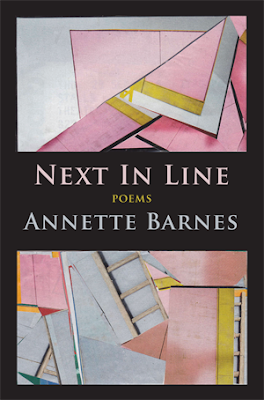 |
| Next in Line |
A definition of “philosophical” I once read is: “exploration of what the game is about.” Another definition describes the word as meaning that local concerns are trivial in the light of more profound truths. As I read Pinyon Publishing’s latest poet, Annette Barnes, who was a former professor of philosophy, these definitions seem to fit her apprehensions of our time on earth.
The lead poem in this volume, “What We Want,” is one that reflects a certain detachment while the poet thinks through issues facing humans “doing what they want,” — issues of power, non-sharing, ruthlessness, war… “like animals on a short leash who/discover the leash is gone and suddenly take off,/thinking freedom’s free”… However, she concludes with a beautiful resolution: “the view from up here swarms with light the way/bees pulse a hive, but you must climb up before/you can hear the souls of the fallen rise.”
Barnes isn’t dispassionate in her observations about ordinary life and attempts to see things from every angle as she explores the “Imperfections of Everyday Life,” bringing the trivial to higher thought as “Boys in red caps and jackets kick/a soccer ball, tread on the daffodils…” To me, this poem exemplifies the carelessness of contemporary living, “the women to her left talk[ing]/through the mid-week matinee, tak[ing] no notice of attempts/to quiet them…” I hear echoes of W.H. Auden in the lines: “Living on a planet whose core of/molten rock erupts infrequently/allows us to be careless.” To some readers, she may seem to be dispassionate in the face of adverse conditions but in the spirit of a true philosopher, her love of wisdom overrides difficult ordinary situations.
Comic relief comes through a wry poem entitled “The Cat,” who “when annoyed/wags her tail/like a spinster’s finger…a Julia Child/about food/spends a night/licking Brie/Learns only what she wants…doesn’t learn to fetch,/carries her weapons concealed.” Another tongue-in-cheek concerns “Religion” in which Barnes explores the number three, writing that because she lived at three three three, “the Trinity appealed to me./Jesus crucified, a perfidy/that hides Judas made reality,/the Virgin birth, anomaly,/the Resurrection, mystery,/three, distant in unity,/what more ask of Divinity?”
One of her poems reminded me of the poet Billy Collins, again comic relief overcoming the objective of profundity. It’s entitled “Topics For A Book Club Discussion (Recommended for ages six and above).” Number 4. within the poem features Humpty Dumpty: “Was Humpty Dumpty/a. a king/b. a cannon/c. an egg./Did Humpty Dumpty merit the attention/of so many of the King’s men?/Discuss how one should allocate emergency/relief resources.” Barnes also offers discussion topics for “Little Miss Muffet,” “Sing a Song of Six Pence,” and “Old King Cole,” in a highly amusing take on nursery rhymes.
Barnes’ end poem, “Elsewhere” exemplifies Robert Frost”s assessment of good poetry: “A poem should begin in delight and end in wisdom.” She writes that “A blackbird sips rain/water from the hydrangea’s saucer, chirping/between sips. Elsewhere lovers pant between/kisses, butterflies sip tortoise tears and runners/reach finish lines. No bombs go off, no one dies."
In eighty pages of poetry Barnes succeeds in creating direct expressions of profound truths, wisdom that flashes like polished gems. Artistry and amusement entwine throughout this volume.
Annette Barnes has also published two books of philosophy, Seeing through Self-Deception and On Interpretation. She lives in England, and Next In Line is her debut book of poetry. From beginning to end, a “glad surprise,” Pinyon!
Available from Pinyon Publishing, 23847 V66 Trail, Montrose, CO 81403.













No comments:
Post a Comment